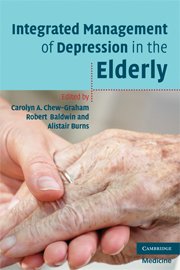Book contents
- Frontmatter
- Contents
- Contributors
- Foreword
- Preface
- Acknowledgements
- 1 Late-life depression: an introduction
- 2 Management of late-life depression
- 3 Management of late-life depression in primary care: case studies UK
- 4 Management of more complicated depression in primary care: case studies UK
- 5 Management of late-life depression across primary and secondary care: case studies UK
- 6 Management of late-life depression around the world: summary of international commentaries
- 7 Resources
- Appendix: International commentaries
- Index
- References
6 - Management of late-life depression around the world: summary of international commentaries
Published online by Cambridge University Press: 18 December 2009
- Frontmatter
- Contents
- Contributors
- Foreword
- Preface
- Acknowledgements
- 1 Late-life depression: an introduction
- 2 Management of late-life depression
- 3 Management of late-life depression in primary care: case studies UK
- 4 Management of more complicated depression in primary care: case studies UK
- 5 Management of late-life depression across primary and secondary care: case studies UK
- 6 Management of late-life depression around the world: summary of international commentaries
- 7 Resources
- Appendix: International commentaries
- Index
- References
Summary
International commentaries for the integrated management of depression
We asked clinicians from different countries to comment on the case history below, wherever possible as a joint response from a primary care physician and a specialist in psychiatry.
Breathlessness and irritability
Miss Laura C is an 82-year-old lady with severe osteoarthritis and chronic obstructive pulmonary disease. She stopped smoking in her 60s and is very resentful that her breathlessness is so troublesome. She gets so much pain in her back and knees that she doesn't always feel like going down to the communal room in her sheltered (warden-supervised) accommodation or to the weekly lunch at the local church group.
Miss LC feels that her sleep is affected by her shortness of breath and the pain in her knees, and she has been waking in the early hours of the morning and not getting back to sleep. She feels tired, irritable and miserable all the next day and tends to nap every afternoon. She knows that people have called on her or have telephoned, but she admits that she often cannot bother to answer. She feels very lonely and over the past month has wondered if life is worth living.
The following synopsis encompasses contributions from Australia, Bulgaria, Canada, Denmark, France, Hong Kong, Japan, The Netherlands, Norway, Romania, Spain and the USA (see List of Contributors). The individual commentaries can be found in the Appendix.
- Type
- Chapter
- Information
- Integrated Management of Depression in the Elderly , pp. 102 - 113Publisher: Cambridge University PressPrint publication year: 2008



